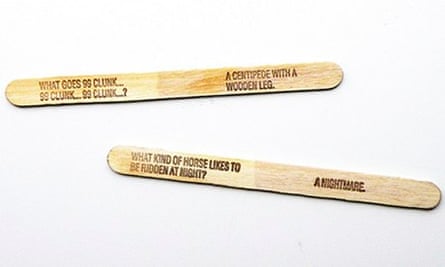Argos is on the pathway of modernity and laminated catalogues and little blue pens are falling by the wayside as tablets take over. Small pen-and-pencil fans can take heart: you can still get your fix in William Hill and Ikea, although an out-of-town superstore seems a long way to go for a free pencil. Life will almost certainly carry on OK without the little blue Argos pens. But why is there something disproportionately touching or irksome or disappointing about the trivial losses that strew our paths to progress? Such as ...
The lids of Smarties boxes
They were plastic, with a letter of the alphabet embossed on the underside, so you could run your finger over it like braille. The thrill consisted in not knowing what letter you had bought until you opened the tube, thereby forging for generations of children a lifetime association of literacy and confectionery. Maybe it was Smarties and not Mr Hartley the English teacher after all who gave me my love of reading. You could collect the little plastic discs, line them up, play with them, and, crucially, replace them, which made your Smarties last longer. In 2005 Nestlé Rowntree announced it was changing the Smarties' 68-year-old packaging design. The cardboard fliptop still has a letter on, but you flip it open and it hangs there gawping at you until you've eaten the lot.
KitKat's foil wrapper
Not to sound confectionery-obsessed, but the foil, which disappeared in 2001, was like having your present wrapped twice. There were two barriers to entry, which only made the moment of arrival more exciting. Apparently, the foil had other uses too. (Pete Doherty is said to have liked KitKats.) More innocently, you could crack the inner wrapper open by running your thumbnail down the gap between two fingers, making a jagged rupture with a zip-like rip, and break your way in.
Chatrooms
In the late 90s and early 2000s, chatrooms were a place to make friends. Two people I sit near met not in the workplace but on AOL Music Chat UK in 2001. As far as I know, neither of them is really odd. But at some point "chat" became a synonym for something seedy. Now people don't hang out in chatrooms, they visit forums or they tweet. (Twitter isn't a chatroom, it's a giant echo chamber.) In 2003 MSN closed its European chatrooms citing child protection reasons. Last year Yahoo did the same.

Jokes on lolly sticks
I eat a lot of lollies and can confirm that there are no jokes on Milk lollies, Fruit Pastille lollies, any species of Magnum, Del Monte fruit, Calippo, Solero, Feast, Fab or Zoom. If you find a joke on a lolly, please let me know. Apparently, they experienced a brief revival by Cadbury after being phased out in the late 80s. The joke was a genius idea: the lolly's gone, but it has left behind a riddle. You've eaten all there is to eat, but there is still some fun left. The ultimate consumer consolation, and the socialisation of what can sometimes be a solitary eating experience.
Toys in cereal boxes
Remember when each box of cereal used to hide a little plastic toy or transfer? They were devised as a marketing strategy by Kellogg's in 1909. The hidden toy brought suspense to a routine part of the day: would the prize land in your bowl or someone else's? I buy a lot of cereal but my children had never even seen a toy in their cereal until we had a holiday in Spain. Apparently they are still thriving in France too.

Bus conductors
And, in particular, the little machine that whirred out the ticket. There is no drama in slapping a card on a reader. True, bus conductors are not entirely extinct, although there seems to be a consensus that they do not fit into any idea of modernity. Perhaps that explains why when Go-Ahead London was recruiting for a conductor-type role earlier this year, it advertised for a "bus passenger assistant".
Nerds
You remember, those little orange and green sweets that came in a cardboard box, one compartment for each colour. These used to be ubiquitous in the UK: dirt cheap and brightly coloured, the perfect sweet for supermarket checkouts. But like a lot of confectionery that has been the subject of a nostalgic revival, they have become fetishised and are no longer cheap and no longer available from sweet shops. You can buy a pack of four for £8 at Debenhams.
Roaches on Rizla packs
I am ashamed to say this is an area of limited experience for me, so I'm handing over to my friend Fritz. "Rizla packs used to ingeniously slot together so you could reassemble them after grabbing out the green bit of card for roach." Hang on, take me through that again. "To keep the leaves straight there's a piece of thin green card, which is at the middle of the sheaf of rolling papers. It was traditional to use this first as roach before ripping up the rest of the pack. Now to save half a square centimetre of card they glue them instead and a whole new generation of potheads are missing out on a valuable origami lesson." Good point, Fritz.
Salt sachets in Smith's crisps
Relax. These got revived when Walkers bought them out.

Comments (…)
Sign in or create your Guardian account to join the discussion